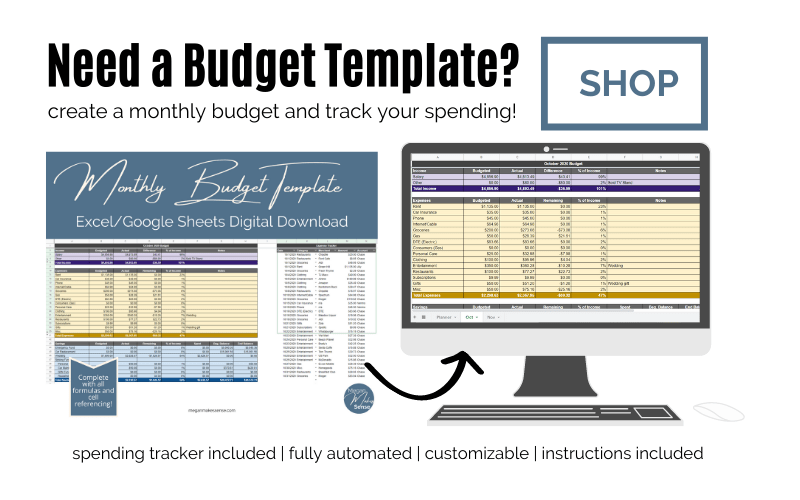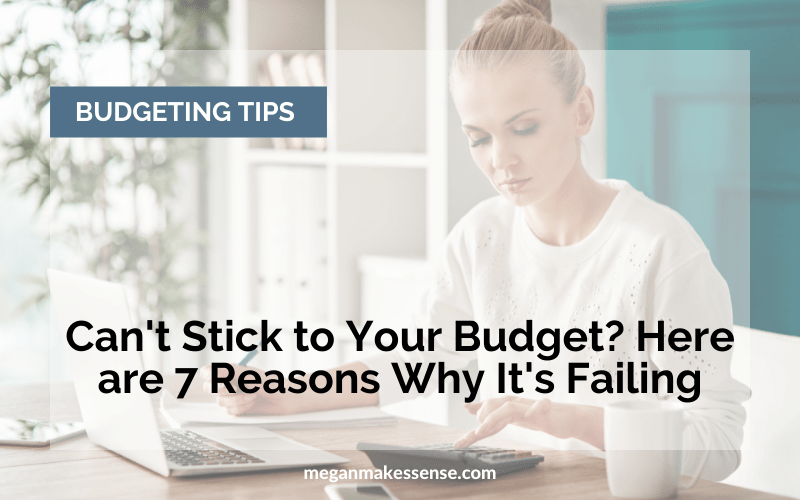So you’ve created your first budget in Excel with all the pretty colors and charts. You were so excited to start budgeting until you realized that you actually have to stick to your budget!
Sticking to your budget is a lot easier said than done.
Maybe you spent too much eating out this month, went on one too many Target runs, or forgot about your renter’s insurance premium.
Not to mention that coming up with the perfect budget categories and amounts also takes practice!
So many moving parts can make it seem impossible to stick to a budget! But with a little bit of tweaking and practice, it can be done.
Here are a few reasons why your budget is failing and seems impossible to stick to.
I’ll also give you a few of my best budgeting tips and tricks for beginners to help you create and stick to a sustainable budget!
7 Reasons Why You Aren’t Sticking to Your Budget
I want to preface this by saying that a budget gives you the permission to spend.
It is simply telling your money where to go so that you have control over it. Budgeting makes the things you want out of life possible.
A budget is not meant to be overly restrictive, only for “poor” people, or overly complicated.

1. You’re Not Tracking Your Spending
The most common reason people can’t stick to their budget is because they don’t actually track their spending.
Tracking your spending in your head DOES NOT count!
Budgeting isn’t just writing out your expenses and hoping for the best.
This is especially important for variable categories like groceries, eating out, and shopping. It is so easy to underestimate how much you actually spend in these categories.
Tracking every single purchase (at least at the beginning when you’re new to budgeting) is key to staying on budget.
I’ve seen too many times where people say, “Yeah I only spend $100 a month on restaurants” and then they go back through their spending and find out that they actually spent $450 in the last month!
I’ve been budgeting for over 2 years now, and I still record every single purchase in my budget spreadsheet so I know exactly where my money is going.
Budgeting tip: Set a specific date and time to check in with your budget a few times a week. Record all of your purchases from the week and see how much you have left to spend in each category.
Make it fun by allowing yourself a glass of wine or a coffee during your budgeting date!
(P.S: my monthly budget template has a built-in expense tracker that will automatically pull in each of your purchases and allocate them to the correct category!)

2. You’re Not Being Realistic
Another reason why people don’t stick to their budget is that they’re not being realistic.
So many times I see someone make their first budget and not give themselves near enough “fun” spending money!
Yes, it is okay to spend money on things that bring you joy!
These people restrict their spending so much that they start resenting budgeting altogether. You’ll set yourself up to fail if you never allow yourself any spending money.
You set a super restrictive budget that is impossible to stick to you, you inevitably go over said budget, and then you get so discouraged that you quit budgeting and overspend even more.
Sound familiar?
Budgeting tip: go through all of your spending from the last 3 months and allocate each purchase to a category. You’ll get a realistic idea of what you actually spend.
You could also decide to allocate a percentage of your take-home pay to wants. Depending on your financial situation, you may allocate more or less.
Everyone’s budget will look different!
3. You Don’t Have a “Why”
Have you ever thought about why you want to start budgeting and getting better with your money?
If you don’t have a crystal-clear reason on why you want to get better with money, you’ll never stick to your budget.
Think about what you want out of your life and future (big question, I know!). What does that look like for you? How is it different than where you’re at now?
Now you need to think about what you need to do to make those dreams possible. It likely involves some intentional financial planning (aka, a budget).
It also means some reflection on the things that really matter to you.
If you want to retire one day, make a plan to own a home, travel the world, or fund your kids’ college, you have to learn how to budget.
Thinking about those big-picture goals suddenly makes those mindless Target runs seem a whole lot less important.
Budgeting tip: Instead of saying negative things like, “I can’t afford that” or “I’ll never have enough money to do that,” try replacing them with positive thoughts. Try, “I’m not shopping for wants this weekend because I’d rather save that money toward my travel fund” or “I’m choosing to allocate that $500 a month to my Roth IRA because a secure financial future is more important to me than driving a new car.”
Money mindset affects you more than you think!
4. You’re Using the Wrong Tools
Another reason why your budget might be failing is that you’re not using the right budgeting system!
If you absolutely despise spreadsheets, don’t use a spreadsheet to budget!
Or maybe get a spreadsheet template so that you don’t have to worry about Excel formulas or forgetting categories.
You can get a budgeting app, write it out in your planner, or use the notes app in your phone. Try a few different systems and see what works for you!
The important thing is that you record your budget somewhere and actually track your spending.
Related: How to Create a Budget and Actually Stick to It: Budgeting For Beginners
5. You’re Not Utilizing Sinking Funds
Do you know what a sinking fund is?
It is setting aside a small amount of money each month to fund a larger expense or purchase in the future.
Large, yearly expenses can bust your budget if you’re not prepared for them!
Budgeting Tip: Do yourself a favor and build these expenses into your monthly budget and set the money aside into a high-yield savings account. Things like your yearly car insurance premium, a new car, or Christmas gifts are all perfect sinking fund categories.
It’s a lot easier to think about a $600 6-month car insurance premium as setting aside $100 per month! That way, the money will be ready when you need it AND it won’t wreck your budget when the bill comes due.
If you notice a lot of unplanned “needs” coming up in your budget, that’s a clear sign that it’s time to start a sinking fund for that category!
Related: 9 Essential Sinking Fund Categories to Add to Your Budget This Month
6. You’re Not Taking Advantage of Automatic Transfers
You can also automate a lot of your budgeting!
If you’re someone who often forgets to make transfers to savings or your investing accounts, setting up automatic transfers could be a huge benefit.
Budgeting tip: Set up automatic transfers on the same days that you get paid. You won’t forget that Roth IRA contribution or student loan payment and it prevents overdrafting your account.
Plus, if the money is already gone on payday, you can’t spend it!
Automatic transfers are also great for those that struggle with impluse spending.
7. You’re Not Checking Your Calendar
No two months of budgeting are going to look the same. Birthday parties, weddings, back-to-school shopping, etc all happen throughout the year.
Therefore, it is not realistic to expect your January budget to look like July’s.
It is okay to spend more on entertainment during the summer if you absolutely love outdoor concerts.
Budgeting in wedding or birthday gifts one month and not the next is OKAY!
Budgeting tip: If you know that you have a wedding one month or need to go shopping for something, add it to your budget or start a sinking fund.
Remember that a budget gives you permission to spend!
Best Budgeting Tips and Tricks
Here are some more bugeting tips to help you stick to your budget!
- If you struggle with impulse spending, try opening separate checking accounts for needs (rent, bills, groceries) and wants (eating out, shopping). You can easily see how much money is left in your “wants” account and choose to not carry that debit card into Target if you only need to get paper towels and laundry detergent.
- Stoping using your credit card if it tempts you to overspend.
- If you go over budget in one category, pull from another category to cover it. For example, if you go $50 over budget in eating out, consider pulling $50 from your entertainment budget to even it out. Budgets should remain flexible!
- Keep a checking account “buffer” amount. I personally like to keep about a months’ worth of necessary expenses in my checking account so I’m never worried about overdrafting when I pay a bill. Keeping an extra few hundred or thousand dollars allows you some wiggle room if something happens.
- Set a weekly date to check in with your budget, and make it fun!
- Keep large expenses like housing, food, and transportation in check. Your housing payment shouldn’t be more than 25% of your take-home pay and aim to spend less than 10% on vehicle-related expenses (payment, gas, insurance). Hint, ditching your car payment helps a ton with this!
- ALWAYS have a miscellaneous category in your budget. Something always comes up.
- Think of your budget in weekly allowances. For example, if you budget $400 a month for groceries, aim to spend about $100 per week.
- Remember that each month might look different and don’t expect to be perfect at budgeting right away.
This post was all about the 7 reasons why you can’t stick to your budget and how to fix them, along with my best budgeting tips for beginners.
Have you made any of these budgeting mistakes? Let me know in the comments or shoot me a dm on Instagram!
I’d love to hear from you!
-Megan

Megan is an automotive engineer, newlywed, and personal finance blogger from the midwest. She found her passion for personal finance after starting her first “real job” after graduating college. Now, she helps other young professionals become more intentional with their money in order to build wealth for financial freedom. In her free time, she loves to travel, hike, and play euchre with her family. Read more about her story here.


Pingback: How to Create a Budget and Actually Stick to It: Budgeting For Beginners - Megan Makes Sense
Pingback: The Top 5 Worst Money Mistakes to Avoid in Your 20's - Megan Makes Sense
Pingback: 3 Actionable Personal Finance Rules to Help You Live Below Your Means - Megan Makes Sense
Pingback: How I Paid off $56,000 of Student Loan Debt in 31 Months - Megan Makes Sense